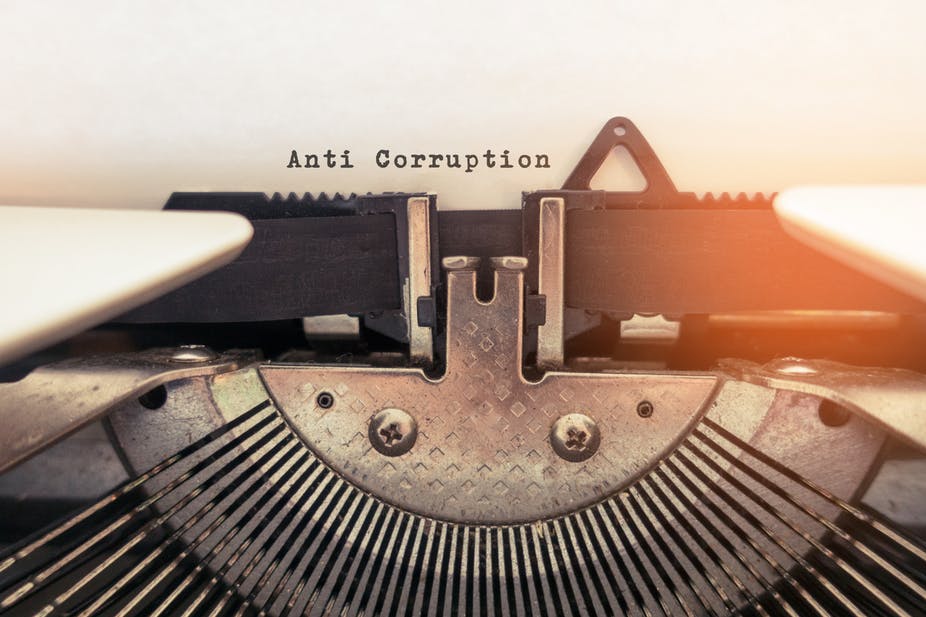What Does Corruption Mean to You? Examining the Plural Meanings of Corruption
SPECIAL FEATURE, 18 Dec 2017
Kanti Pertiwi – The Conversation
8 Dec 2017 – The global anti-corruption movement has long been dominated by a rationalist approach. Proponents of this approach believe that countries can reduce corruption with the presence of democracy, good organisational culture and governance. This approach also sees corruption as a moral problem.
Corruption has been commonly referred to as “cancer”, “AIDS“or ”the root of all evil“ that robs the poor and damages the moral of society.
However, such construction of meaning needs to be examined. As we welcome the International Anti-Corruption Day on December 9th, we need to be critical towards the dominant voices shaping the definition of corruption and how anti-corruption becomes articulated as a movement.
Scandals like Paradise Papers, and Panama Papers as well as Enron and Unaoil cases show that even countries that are considered to have mature democratic systems, the best work ethics and good governance are not immune from corrupt behaviours.
An ideological tool
Economist Jeffrey Sachs argued that ending corruption should start with the United Kingdom and the United States because the two powerful countries also have a “culture of corruption” by letting it happen openly. Legalising the existence of tax havens is essentially making it easy for the rich to avoid paying taxes.
The global anti-corruption movements often face difficulties in encouraging behavioural change. That’s because Western anti-corruption elites have dominated the movement. This has silenced those who are most affected by the movement, the marginalised groups.
For David Kennedy, a Harvard law professor, the anti-corruption concept is more appropriately viewed as an ideological tool to control those who play outside the ruling system.
Anti-corruption has created a stigma against local economic and political systems. Stigmatising these local systems as more inferior, according to Kennedy, is part of an effort to perpetuate power imbalances.
Kennedy also criticises anti-corruption practices that view corruption as an acute moral problem that has infected all sectors and layers of society. Looking at corruption as a moral problem ignores the conditions of post-colonial societies such as Indonesia that is influenced by historical contexts, political transformation processes, the economy and socio-cultural dynamics.
Kennedy’s view echoes Kartini’s, an Indonesian thinker who lived during Dutch colonial rule. She shared a similar observation when writing about how corruption in her time was a combination of economic pressures, imperfect governance system, and people’s social expectations.
Today Indonesia still face similar challenges. The World Bank reported that poverty reduction has slowed while economic inequality has increased. Additionally, Indonesia still needs to improve public sector management – a problem that can’t be easily attributed to individual morality.
The anti-corruption industry
Globally, anti-corruption has become an industry worth more than US$5 trillion. Seminars and workshops on anti-corruption and good governance have been held not only in Indonesia, but across the world.
Various pacts and conventions have been signed such as Council of Europe Criminal Law Convention and Protocol on Corruption, African Union Convention on Preventing and Combating Corruption, UN Convention Against Corruption, and OECD Anti-Bribery Convention.
At the organisational level – either public or private – there have been various anti-corruption instruments such as training curriculum, various modules, pocket books, to children’s games.
In 2001, Tara Polzer wrote that the global anti-corruption movement led by agencies such as the World Bank and Transparency International could not be separated from the global politics in the late 1990s.
Following the Asian financial crisis in the late 1990s, donor countries, concerned over corrupt practices by political elites in developing countries, pressured the World Bank to push for more accountability on how development funds are channeled.
The World Bank then changed its strategy and started to address corruption eradication in lending countries. This was originally regarded as a domestic issue that was off limits for the international financial institution.
Since then, the anti-corruption movement has been carried out with fervor, targeting social values and political systems that are considered “primitive” or “distorted”.
Often the fight against corruption targets the wrong practices. For instance, in some cases of corruption related to the procurement of goods and services, the zeal for anti-corruption has lead to the criminalisation of things that are not qualified enough to be considered as an act of corruption.
The need of an alternative approach
Some researchers have proposed alternative approaches that capture how corruption is viewed by individuals involved, not through an “outsiders” perspective.
For example, the study of ethnography in Russia explores how local people view the Blat practice, categorised as nepotism by the anti-corruption movement, as a regular social activity and has even become an important part of the society’s local identity. It turns out that the Blat practice, as an unwritten social convention, has its own mechanism in overcoming ineffectiveness of written regulations.
Meanwhile, a study in Tanzania reveals that the anti-corruption movement has created many regulations that in concept aim to emancipate the poor but in practice suppress them. Precisely through the practices that are common to be called corruption marginalised people can access public service and benefits from income redistribution. This is similar to “cigarette money” or “sweat money” in Indonesia.
My disertation also reveals that the global anti-corruption movement tends to ignore alternative interpretations rooted to identity. Giving away money or things as an “expression of gratitude”, viewed as a corrupt practice by the anti-corruption movement, is commonly interpreted as a gesture of appreciation in Indonesia.
Anti-corruption in the future
Corruption needs to be understood in its context. We should view corruption that occurs in the bureaucratic level in a society in transition as growing pains that will heal as the population becomes more educated and wealthy.
Currently, a handful of rational approaches have also started questioning the assumptions that corruption is bad for growth. Some countries without good governance is growing because of “corruption”. In some Asian Pacific countries, it turns out that “corruption” is useful for their economic growth.
These findings should not be viewed as a defense for corruption, but instead as a note that every economic system has different growth mechanism.
Corruption as a social construct
Sociologist Mark Granovetter wrote that what is considered corruption depends on the position and the interest of the related individual.
Corruption can be subjectively interpreted. These interpretation often contradicts the mainstream definitions. This demands a space for alternative interpretations because often the differing interpretations hampers the fight against corruption. Terms like “transportation money”, “gifts”, and “charity”, should be interpreted through the lens of related individuals to achieve a solution that resonates with them.
One of the strategies is to acknowledge the existence of these interpretations then think about how to manage them attentively, not dismissively. We should sort out practices that have been categorised into the big basket of “corruption”. We should identify the root meanings of these practices and develop solutions based on the economic and socio-cultural contexts of these actions.
Contextualisation of anti-corruption is not an effort to justify corruption, but rather an attempt to increase ownership and effectiveness of the movement. As a member of the Third World Indonesia needs to take a closer look before adopting concepts that are considered universal. By doing this Indonesia can avoid creating social problems from alienating its own identity for ideas that do not fit with values such as reciprocity and interdependence.
Reformulating the anti-corruption movement may seem radical or even odd. Even so, we should not fear something that seemed strange as long as we have a strong and legitimate foundation of thinking. More importantly, this may prevent anti-corruption from becoming a meaningless slogan that does not have a real impact in changing people’s daily behaviours.
_______________________________________________
 Kanti Pertiwi – Lecturer, Universitas Indonesia
Kanti Pertiwi – Lecturer, Universitas Indonesia
This article was originally published in Indonesian
Go to Original – theconversation.com
DISCLAIMER: The statements, views and opinions expressed in pieces republished here are solely those of the authors and do not necessarily represent those of TMS. In accordance with title 17 U.S.C. section 107, this material is distributed without profit to those who have expressed a prior interest in receiving the included information for research and educational purposes. TMS has no affiliation whatsoever with the originator of this article nor is TMS endorsed or sponsored by the originator. “GO TO ORIGINAL” links are provided as a convenience to our readers and allow for verification of authenticity. However, as originating pages are often updated by their originating host sites, the versions posted may not match the versions our readers view when clicking the “GO TO ORIGINAL” links. This site contains copyrighted material the use of which has not always been specifically authorized by the copyright owner. We are making such material available in our efforts to advance understanding of environmental, political, human rights, economic, democracy, scientific, and social justice issues, etc. We believe this constitutes a ‘fair use’ of any such copyrighted material as provided for in section 107 of the US Copyright Law. In accordance with Title 17 U.S.C. Section 107, the material on this site is distributed without profit to those who have expressed a prior interest in receiving the included information for research and educational purposes. For more information go to: http://www.law.cornell.edu/uscode/17/107.shtml. If you wish to use copyrighted material from this site for purposes of your own that go beyond ‘fair use’, you must obtain permission from the copyright owner.
